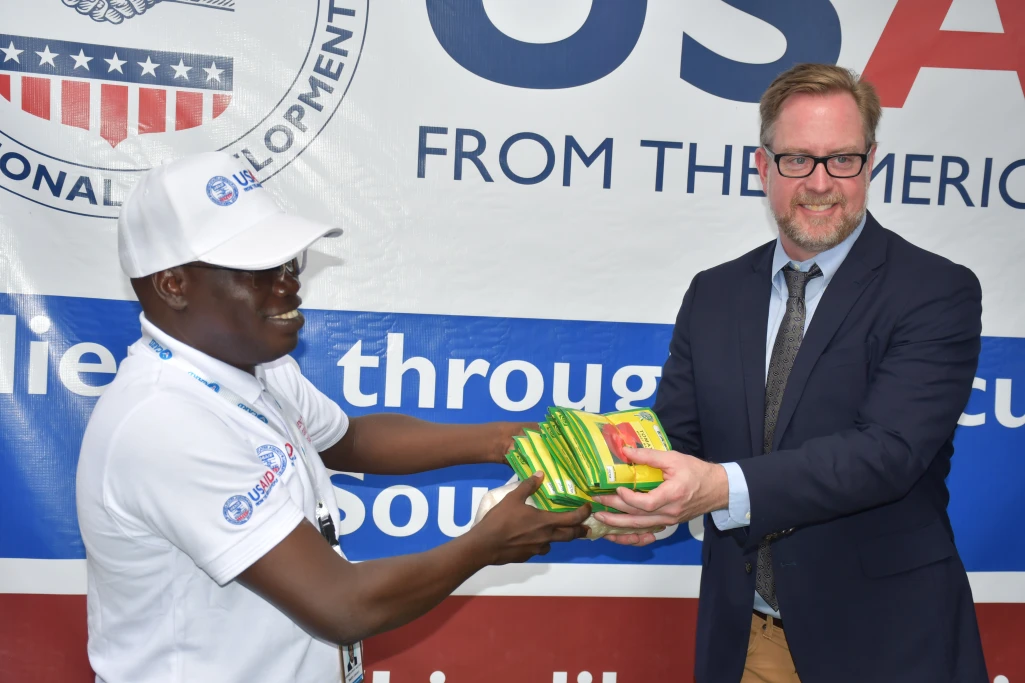
The U.S. Agency for International Development (USAID) on Thursday handed over agricultural supplies and equipment to partners to support South Sudanese farmers, businesses, and communities.
The Resilience through Agriculture in South Sudan (RASS) Project targets 5 Counties.
The livelihood kits include seeds, tools, and equipment to ensure smallholder farmers and nascent micro, small, and medium-sized enterprises improve food security and livelihoods in Akobo, Budi, Jur River, Kapoeta North, and Wau counties.
It is expected to “improve the effectiveness of local system, strengthen the capacities of community groups to achieve gender responsive and diversified market sensitive agricultural production.”
The new Integrated Food Security Phase Classification (IPC) released yesterday shows that 54% of the population of 12.5 million in South Sudan are in high acute food insecurity.
“It is clear there are many people in South Sudan who are food secure especially in rural counties of this country,” said Darren Manning, USAID Acting Mission Director.
“Through RASS, USAID works to improve resilience and food security in the targeted USAID counties through strategic intervention. These equipment such as grinding milling and other items will be use to address food and security challenges in the targeted counties.”
According to the IPC report, the Key Drivers of Acute Food Insecurity in South Sudan are conflict and Insecurity, climatic shocks, economic decline, and low production. The decline in food security and high prevalence of malnutrition is also linked to a combination of conflict, poor macroeconomic conditions, extreme climate events, and spiralling costs of food and fuel and decline in funding humanitarian programmes in the countries.
Mr. Manning said the intervention by USAID will connect grassroots agro-dealers with input suppliers to create a chain of continuous input suppliers to the communities level, promote functionality of village saving and loans association as viable community level financial institution.
This is “to mobilize and lend out savings for investment purposes, facilitating youth groups in accessing fishing nets and canoes to ensure that youth are engaged in fisheries activities and do preservation of fish which can be supplied to the local market.”
The Resilience through Agriculture in South Sudan (RASS) Project will be implemented by six organizations based in South Sudan
It will reach out to 105 farmer groups and 2,700 beneficiaries through Christian Action for Relief and Development in Wau County of western Bhar El Gahzal (WES), Farm Stew South Sudan in Jur River County (WES), Grassroots Relief and Development Agency in Akobo County of Jonglei state, Saint Monica Agency for peace and development in Budi County of Eastern Equatoria, Hope Agency for Relief and Development in Jur River County (WES) and Rural Women for Development South Sudan in Kapoeta North (EES).

The partners received grinding mill machines, wooden fishing nets and canoes, insulated cold chain fish storage, maize Sheller, among many other tools.
“All these activities are meant to graduate our communities from help reliance or dependence on humanitarian assistance and to let them start shifting or transitioning toward development assistance and economic development,” said Itai Makanda, RASS Chief of Party.
Lasu Charles Denesio who spoke on behalf of the implementing partners said the support will address the severe acute food insecurity in South Sudan.
“This will enable farmers and communities to target market oriented production by increasing their productivity, their product quality and becoming reliable suppliers,” he emphasized.
The IPC report said the severe food insecure population require resilience-building support and enhanced disaster risk reduction (DRR) strategies to mitigate the effects of climate change.